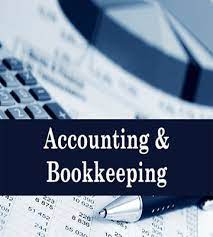Bookkeepers and Accountants are two different positions within the world of finance and accounting, both of which are essential for managing a business’s finances. Although both perform related tasks, such as handling financial transactions, there are significant differences between the two.
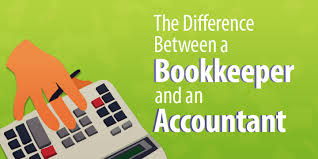
This article will explore the differences between bookkeepers and accountants, and explain the roles each plays in helping a business to manage its finances.
Definition of Bookkeepers and Accountants
Bookkeepers and accountants both are essential to the efficient running of any business, and it is important to understand the differences between the two roles.
Definition of Bookkeeper
A bookkeeper is a type of accountant whose main job is to keep detailed records of sales, purchases, and other financial transactions.
Depending on the preferences and habits of different institutions or people, the types of transactions that are recorded and how they are recorded can vary a lot.
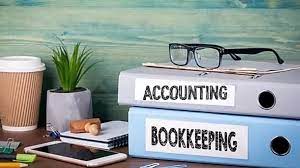
Definition of Accountant
An accountant is a person who works in the field of accounting and does things like research, audits, and analysis of financial statements.
Accountants work for accounting firms or for large companies that have their own accounting departments.
They are in charge of making sure that companies keep accurate records of how much money they make and how much money they spend.
Differences Between Bookkeepers and Accountants
Bookkeepers and Accountants both handle financial matters, but their roles and duties differ. Let’s look at some of the pointers below to understand it better:
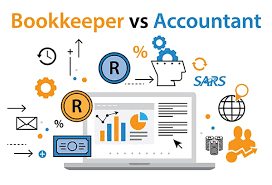
Education and Certification
Bookkeepers and Accountants both play an important role in the financial management of businesses. While the two professions are often confused, there are several key differences between bookkeepers and accountants.
Education:
Bookkeepers typically only need a high school diploma or equivalent to pursue their careers. Accountants, however, usually have a minimum of a bachelor’s degree in accounting, finance, or a related field.
Certification:
Bookkeepers are not required to have any certifications, but some may opt to obtain a Certified Bookkeeper designation, which requires passing a certification exam, as well as a certain number of continuing education credits.
Accountants, on the other hand, are required to obtain a Certified Public Accountant (CPA) certification, which requires passing a series of exams.
Duties and Responsibilities
The duties and responsibilities of Bookkeepers and Accountants include:

On the basis of Purpose
- Preparing financial Statements
- Accountants measure, prepare, analyze, and make sense of the financial statements so that they can be collected and shown.
- While bookkeepers write down all income, expenses, and other transactions to make an accounting ledger.
Based on the role of management
- Top management pays close attention to the work of accountants because they care a lot about the information and predictions that accountants make.
- How the bookkeeper works is less important to the top management.
On the basis of the tools
- Balance sheet, income and expenses, cash flow statement, and position statement.
- General Ledger, Customer Ledger, Supplier Ledger, and Cash Book.
On the basis of making decisions
- Accounting records can be used to help make business decisions.
- Bookkeepers’ records can’t be used to make financial decisions independently.
Depending on their skills
- Accountants need special analytical skills because their jobs are so hard.
- Most of the work a bookkeeper does is already set up, so they don’t need any special skills.
What is the difference between a bookkeeper and an Accountant?
Bookkeeping is more about recording financial transactions and keeping track of paperwork. Accounting is more subjective, and the way you keep your books can tell you a lot about the financial health of your business.
In this guide, we’ll talk about the differences between accounting and bookkeeping, both in terms of how they work and in terms of what they do.
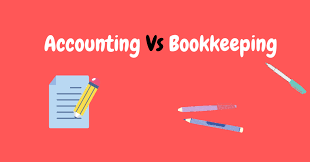
Bookkeeping Vs. Accounting
Below are some key differences between bookkeeping and accounting services:
| Bookkeeping | Accounting |
| Bookkeeping is one of the most important parts of accounting. | Accounting uses the information provided by bookkeeping to create financial reports and statements. |
| Bookkeeping is just one part of the accounting system as a whole. | Accounting begins when bookkeeping stops and covers a wider range of tasks than bookkeeping. |
| The result of the bookkeeping process is that it gives input for accounting. | Accounting leads to making financial statements, which help people make decisions and judgments based on accurate information. |
| Record and sort your daily expenses and payments. | Prepare to adjust entries |
| Send invoices to customers and keep track of payments received. | Reconcile your bank accounts every month. |
| The person who is in charge of keeping the books is called a bookkeeper. | An accountant is a person in charge of keeping track of money. |
| Look at the cost of doing business. | Help the business owner make decisions about money |
| Payroll processing | Prepare the records for the accountant. |
| The bookkeeping process is in line with the rules and ideas of accounting. | Accounting methods and ways to read and understand financial reports can be different from one entity to the next. |
Similarities between Bookkeeping and Accounting:
Bookkeeping and accounting can look like the same job to someone who doesn’t know much about them. Both bookkeepers and accountants use financial information in their jobs.
To get into either job, you need to know the basics of accounting. In smaller businesses, bookkeepers often do more than just record transactions. They also put the financial transactions into groups and use them to make reports.

Even though they may not have the education needed to do these tasks, they can because most accounting software automates reports and remembers transactions, which makes it easier to classify transactions.
Sometimes, an accountant keeps track of a company’s financial transactions. This is part of the accounting process called “bookkeeping.”
The Purpose Of Bookkeeping
Bookkeeping is the process of keeping track of daily transactions in a consistent way. It is an important part of getting the financial information a business needs to run well.

Bookkeeping includes:
- Keeping track of money transactions
- Credits and debits are posted.
- Producing the invoice
- Putting together financial reports (balance sheet, cash flow statement, and income statement)
- Keeping subsidiaries,
- General ledgers, and historical accounts in order and in balance
- Completing payroll
One of the most important parts of bookkeeping is keeping a general ledger. A bookkeeper writes down the amounts from sales and expenses in the general ledger, which is a simple document.
This is known as “posting.” The ledger is updated more often the more sales that are made. You can make a ledger with special software, a computer spreadsheet, or just a sheet of lined paper.
The size of a business and the number of transactions that happen every day, week, and month can affect how complicated a bookkeeping system is.
Your business’s sales and purchases need to be written down in the ledger, and some things need supporting documents. On its website, the IRS says which business transactions need to be backed up by documents.
The Function Of Accounting
Accounting is a high-level process that uses financial data collected by a bookkeeper or business owner to make financial models. Accounting is a more personal process than bookkeeping, which is mostly about transactions.
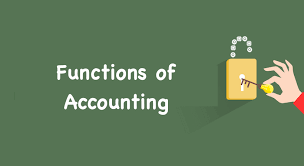
Accounting includes:
- Preparing to adjust entries, which are entries for expenses that have happened but haven’t been recorded yet.
- Reviewing a company’s financial statements
- Cost of operations analysis
- Filing income tax returns
- Helping the business owner understand the impact of financial decisions
Analyzing financial reports is a key part of accounting because it helps you decide what to do with your business. As a result, you’ll have a better idea of how profitable your business really is and how cash flows through it.
Accounting takes information from the general ledger and turns it into information that shows the business as a whole and where it is going.
Accountants help business owners with strategic tax planning, analyzing their financial situation, making predictions, and filing taxes.
Conclusion:
Bookkeepers and accountants both play an important role in the financial transactions of a business.
Bookkeepers typically handle the day-to-day financial transactions, such as invoices, payments, and payroll. Accountants, on the other hand, provide a more holistic view of the financial health of a business.
They manage the bookkeeping tasks and analyze financial data to offer advice and make financial decisions. Both are important for the financial health of a business and work together to ensure accuracy.
JAY’s Choice:-
- Bookkeepers for small business
- 3 Ways to grow your bookkeeping business
- What are the challenges of the Budget session and solutions to improve it?
- How to identify and avoid problems in Bookkeeping
- 10 Types of Cloud-Based Accounting Services
- 10 Benefits of Outsourced Bookkeeping
- How to hire a top bookkeeper: a comprehensive guide
- 5-Ways Hiring A Bookkeeper Can Make Your Business More Profitable
- Bookkeeping For Non-profits
- Accounting Year-End Checklist for Your Small Business


